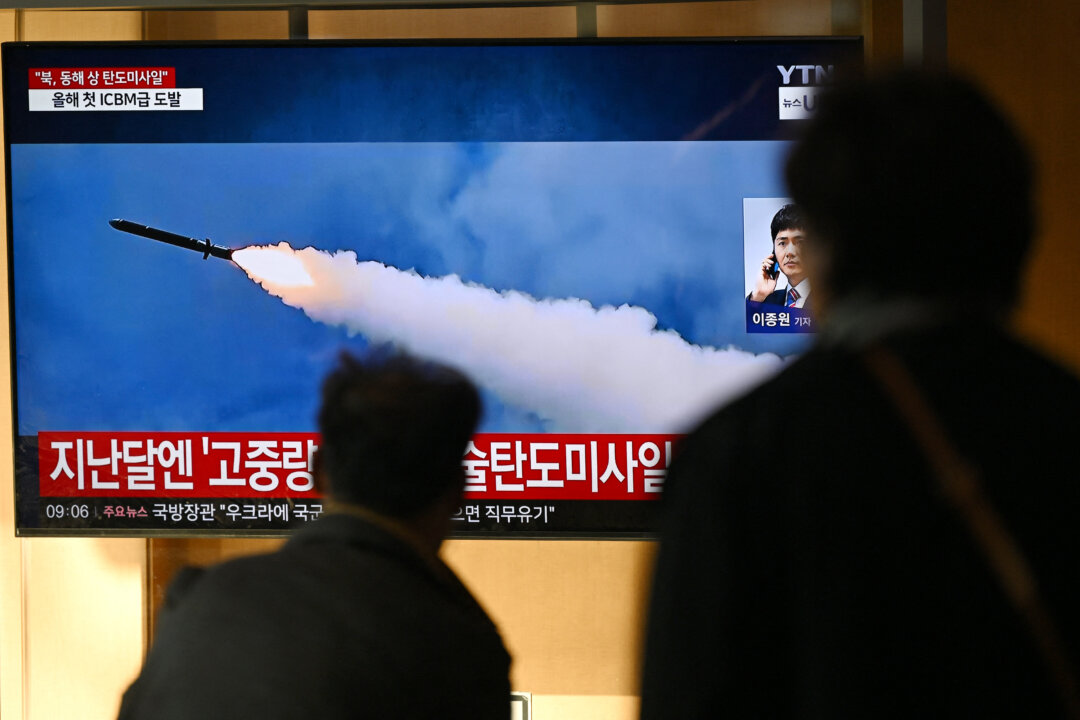Pyongyang has drawn increasing international scrutiny, particularly in light of Kim Jong Un’s decision to send troops to Russia amid the war against Ukraine.
Top diplomats of the Group of Seven (G7) democracies condemned a recent North Korean intercontinental ballistic missile launch “in the strongest terms” on Nov. 5, amid rising concerns about Pyongyang’s close ties with Moscow.
The message from G7 nations—Canada, France, Germany, Italy, Japan, the United Kingdom, the United States, and the European Union’s High Representative—follows a series of missile tests by North Korea, including the firing of its newest long-range intercontinental ballistic missile (ICBM), which was believed to be capable of reaching the United States mainland.
“The DPRK continues to advance its unlawful nuclear and ballistic missile capabilities and to escalate its destabilizing activities,” G7 foreign ministers said in a joint statement, using the abbreviation for North Korea’s official name, the Democratic People’s Republic of Korea.
The ministers renewed the call for complete denuclearization of the Korean Peninsula, urging North Korea to abandon its nuclear arsenal and all weapons of mass destruction “in a complete, verifiable, and irreversible manner.”
Pyongyang carried out an ICBM launch on Oct. 30 (Oct. 31 local time), the first test in almost a year. According to Japan’s defense ministry, that missile reached an altitude of over 4,300 miles during its 86-minute flight trajectory before falling into the waters west of Japan’s Okushiri Island. In response, the United States conducted a joint military exercise on Nov. 3, flying a long-range bomber alongside fighter jets from South Korea and Japan in the waters and airspace south of the Korean Peninsula, according to Seoul’s military.
In a separate statement on Nov. 5, two-thirds of the U.N. Security Council members also issued a strong condemnation regarding that missile launch by North Korea.
The group pointed out that the recent action—preceded by more than 100 ballistic missiles launched by Pyongyang since 2022—violates several Security Council resolutions, poses a threat to international peace and security, and risks undermining the global nonproliferation framework.
“We must not allow the sheer volume of DPRK launches to normalize its unlawful and destabilizing behavior,” said Robert Wood, the deputy U.S. Ambassador to the U.N., who read the statement on behalf of nine other Security Council nations that supported it: Ecuador, France, Japan, Malta, South Korea, Sierra Leone, Slovenia, Switzerland, and the United Kingdom. Also signing the letter were Denmark, Greece, and Panama, which will join the council next January.
The group said the United States had sought to gather support from all 15 council members for a press statement affirming that North Korea’s actions violate U.N. Security Council resolutions. “However, two Council members refused to join a united denunciation and call to uphold the Council’s legally binding measures,” it said.
The countries that opted out of the statement were Russia, China, Algeria, Mozambique, and Guyana. While the statement didn’t name any specific countries, Wood called out Russia and China at the U.N. meeting on Nov. 4, saying that the two permanent members blocked the council from issuing a statement of condemnation, which requires consensus to be adopted.
“Russia and China have shamelessly protected Pyongyang from any reprisal, or even condemnation of its actions,” Wood said.
Tensions escalated further on Nov. 5 when Kim Jong Un’s regime ordered the launch of multiple short-range ballistic missiles toward waters east of South Korea.
Japanese Defense Minister Gen Nakatani told reporters that at least seven of these missiles reached a maximum altitude of 62 miles and traveled as far as 248 miles. Nakatani said Tokyo is analyzing the situation with Seoul and Washington, adding that these missiles fell in waters outside Japan’s exclusive economic zone (EEZ).
Pyongyang’s moves have drawn increasing international scrutiny, particularly in light of Kim’s decision to send troops to Russia amid its war against Ukraine. South Korea’s defense ministry said on Nov. 5 that more than 10,000 troops from North Korea are currently in Russia, with “a significant number” of them having been moved to Kursk and other front lines.
That military cooperation between Pyongyang and Moscow sparked concerns among the G7 group, as well as South Korea and New Zealand. Their foreign ministers raised concern over the potential deployment of these North Korean troops to the battlefield in Ukraine.
“The DPRK’s direct support for Russia’s war of aggression against Ukraine, besides showing Russia’s desperate efforts to compensate its losses, would mark a dangerous expansion of the conflict, with serious consequences for European and Indo-Pacific peace and security,” the ministers said in a Nov. 6 statement.
“It would be a further breach of international law, including the most fundamental principles of the U.N. Charter.”

